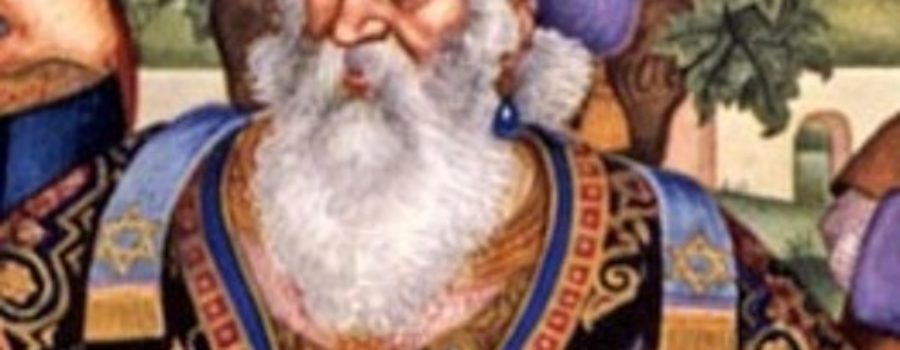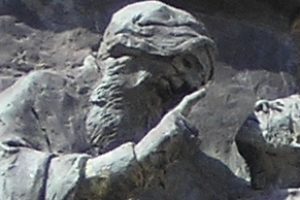In a previous blog, we discussed Nefi’s use of the First Rule of Hillel. In this blog we will discuss Nefi’s use of the Fourth Rule of Hillel. Let’s begin by quoting the opening of the prior blog post:
Things of the Jews
In the Stick of Joseph, Nefi writes:
the Y’hudim do understand the things of the prophets. And there is no other people that understand the things which were spoken unto the Y’hudim like unto them, except it be that they are taught after the manner of the things of the Y’hudim. (2 Nefi 11:2)
Certainly the Seven Rules of Hillel are to be counted among these “things of the Jews” that are needed to understand “the things that were spoken unto the Y’hudim.” The Jewish Encyclopedia says of them that they are “the chief guides for the interpretation of the Scriptures and for the deduction of laws from them.”
Hillel did not create the Seven Rules of Hillel. In fact the Seven Rules of Hillel existed long before Hillel (60 BCE – 20 CE?); he was simply the first to write them down. The rules are so old we see them used in the Tanakh (Old Testament).
For purposes of this article we will only be discussing the Fourth of Hillel’s seven rules, the rule of Binyan ab mi-shene ketubim (בנין אב משני כתובים) which is “building a teaching principle based upon two verses.” This rule allows that a main proposition may be derived from two (or more) passages. Let’s take a look at an example from the Stick of Joseph text:
In 2 Nefi 11:17, Nefi states, “He commands that there shall be no priestcrafts;”. He then continues to define “priestcrafts” in very formulaic language reminiscent of the language of the Mishnah:
…for behold, priestcrafts are:
that men preach and set themselves up for a light unto the world,
that they may get gain and praise of the world,
but they seek not the welfare of Tziyon.
(punctuation and line returns altered for illustration)
Now one might ask where Nefi gets this halachah? Presumably, Nefi is not authorized to invent new commandments; in fact it is prohibited to add commandments to the Torah (Deut. 4:2; 12:32). A prophet or sage may elaborate on a commandment with derivatives, but they cannot invent new commandments.
In this case Nefi has not invented a new commandment. Rather, he demonstrates he has derived this commandment by presenting the halacha against “priestcrafts” as a derivative of the Torah commandment to “love.” He continues his discussion of priestcrafts as follows:
Behold, YHWH has forbidden this thing; wherefore, Adonai YHWH has given a mitzvah that all men should have charity, which charity is love. And except they should have charity, they were nothing; wherefore, if they should have charity, they would not allow the laborer in Tziyon to perish. But the laborer in Tziyon shall labor for Tziyon, for if they labor for money, they shall perish.
2 Nefi 11:17
Thus the halacha against “priestcraft” is a derivative of the Torah commandment “you shall love your neighbor as yourself” (Lev. 19:18). Indeed, Nefi’s illustration demonstrates that love requires caring for one another, including providing for the poor laborer in Tziyon. Therefore the laborer must labor for Tziyon, and not for money.
In the Gospel according to the Hebrews, Yeshua himself presents a similar derivative from this same Torah precept. The Gospel according to the Hebrews (GH) was an ancient, lost, apocryphal gospel that was used by the ancient Nazarenes (the ancient Jewish followers of Yeshua as the Messiah) and the Ebionites (a group of Jewish believers in Messiah who split off from the Nazarenes over doctrinal issues around 70 C.E.). The so-called Church Father Origen wrote:
It is written in a certain Gospel which is called according to the Hebrews (if at least any one care to accept it, not as authoritative, but to throw light on the question before us):
The second of the rich men (it saith) said unto him: Master, what good thing can I do and live? He said unto him: O man, fulfil (do) the law and the prophets.
He answered him: I have kept them. He said unto him: Go, sell al that thou ownest, and distribute it unto the poor, and come, follow me. But the rich man began to scratch his head, and it pleased him not. And the Lord said unto him: How sayest though: I have kept the law and the prophets? For it is written in the law: Thou shalt love thy neighbor as thyself (Lev. 19:18), and lo, many of thy brethren, sons of Abraham, are clad in filth, dying for hunger, and thine house is full of many good things, and nought at all goeth out of it unto them.
And he turned and said unto Simon his disciple who was sitting by him: Simon, son of Joanna, it is easier for a camel to enter in by a needle’s eye than for a rich man to enter into the kingdom of heaven.
Origin; On Mt. 15:14 on 19:16ff in Latin version
Nefi uses the fourth rule of Hillel to build this precept from two passages of Isaiah. The first is Isaiah 3:15, which Nefi cites in 2 Nefi 11:15:
And it shall come to pass that those who have dwindled in unbelief shall be slain by the hand of the Goyim. And the Goyim are lifted up in the pride of their eyes, and have stumbled because of the greatness of their stumbling block, that they have built up many churches; nevertheless, they put down the power and the miracles of Elohim, and preach up unto themselves their own wisdom and their own learning, that they may get gain and grind upon the face of the poor (Is. 3:15). And there are many churches built up which cause envyings, and strifes, and malice; and there are also secret conspiracies, even as in times of old, according to the conspiracies of HaSatan. For he is the foundation of all these things, yes, the foundation of murder and works of darkness; yes, and he leads them by the neck with a flaxen cord until he binds them with his strong cords for ever.
2 Nefi 11:15
Here Nefi is quoting from the following section of Isaiah:
12 As for my people, children are their oppressors, and women rule over them. O my people, they which lead thee cause thee to err, and destroy the way of thy paths.
13 The LORD standeth up to plead, and standeth to judge the people.
14 The LORD will enter into judgment with the ancients of his people, and the princes thereof: for ye have eaten up the vineyard; the spoil of the poor is in your houses.
15 What mean ye that ye beat my people to pieces, and grind the faces of the poor? saith the LORD GOD of hosts.
Isaiah 3:15 KJV
Then Nefi cites Isaiah again saying:
For behold, my beloved brothers, I say unto you that Adonai YHWH works not in darkness. He does not do anything except it be for the benefit of the world, for he loves the world, even that he lays down his own life, that he may draw all men unto him. Wherefore, he commands none that they shall not partake of his salvation. Behold, does he cry unto any, saying, Depart from me? Behold, I say unto you, no; but he says, Come unto me all you ends of the earth, buy milk and honey without money and without price (Is. 55:1). Behold, has the commanded any that they should depart out of the synagogues or out of the houses of worship? Behold, I say unto you, no. Has he commanded any that they should not partake of his salvation? Behold, I say unto you, no, but he has given it free for all men; and he has commanded his people that they should persuade all men unto repentance. Behold, has YHWH commanded any that they should not partake of his goodness? Behold, I say unto you, no, but all men are privileged, the one like unto the other, and none are forbidden.
2 Nefi 11:16
Here, Nefi is quoting from the following portion of Isaiah:
1 Ho, every one that thirsteth, come ye to the waters, and he that hath no money; come ye, buy, and eat; yea, come, buy wine and milk without money and without price.
2 Wherefore do ye spend money for that which is not bread? and your labour for that which satisfieth not? hearken diligently unto me, and eat ye that which is good, and let your soul delight itself in fatness.
3 Incline your ear, and come unto me: hear, and your soul shall live; and I will make an everlasting covenant with you, even the sure mercies of David.
Isaiah 55:1-3 KJV
It is from these two passages of Isaiah that Nefi builds the halacha against priestcraft.
To illustrate: Nefi quotes Isaiah inviting all to come to YHWH “without money and without price” and condemning those who “grind the face of the poor.” From these teachings, rooted in the commandment to love one’s neighbor as oneself, Nefi builds the principle prohibiting priestcrafts, allowing the laborer in Tziyon to labor only for Tziyon, and not for money.
Nefi expertly uses the fourth rule of Hillel to build a halacha upon two or more passages. He formulates the halacha in typical Mishaic style, and establishes the halacha as a specific application under a general Torah command, one which is used in a similar way by Yeshua in the Gospel according to the Hebrews.
Yosef ben Yosef could not have been familiar with this manner of thought, included in what the Stick of Joseph calls “the things of the Jews.” Nefi’s thoughtful discussion of priestcrafts, using the 4th rule of Hillel to deprive a principle from two verses, demonstrates the underlying Jewish thought in this passage, and is yet another illustration of the ancient, Jewish origin of the Stick of Joseph.




Leave a Reply